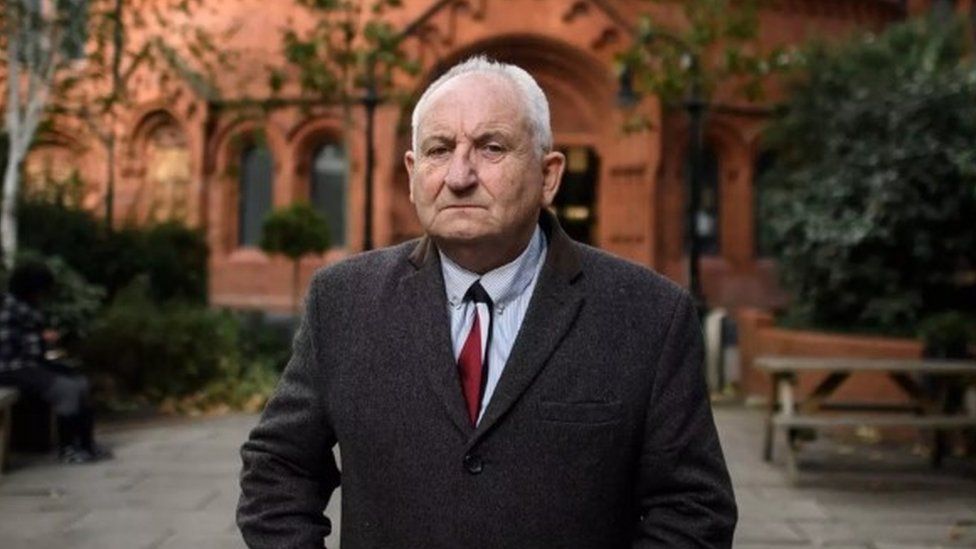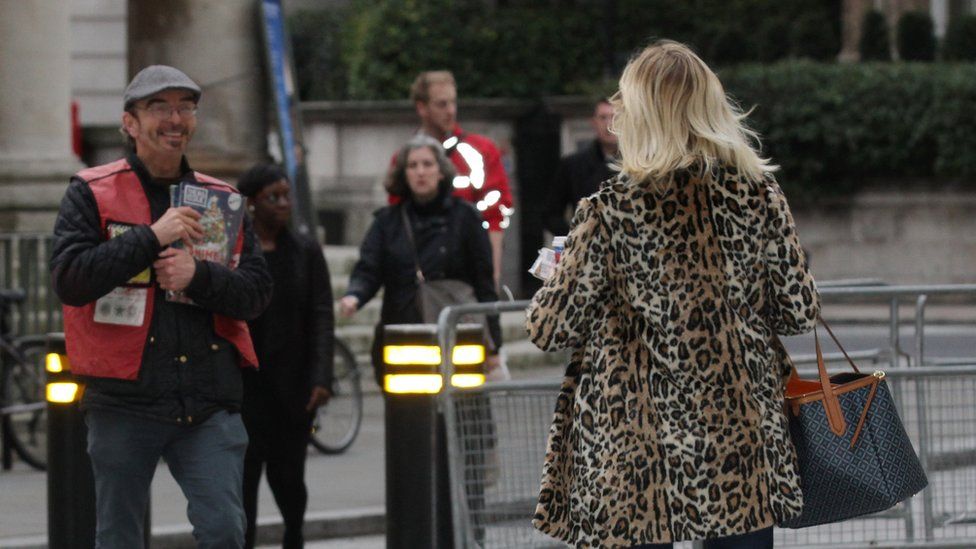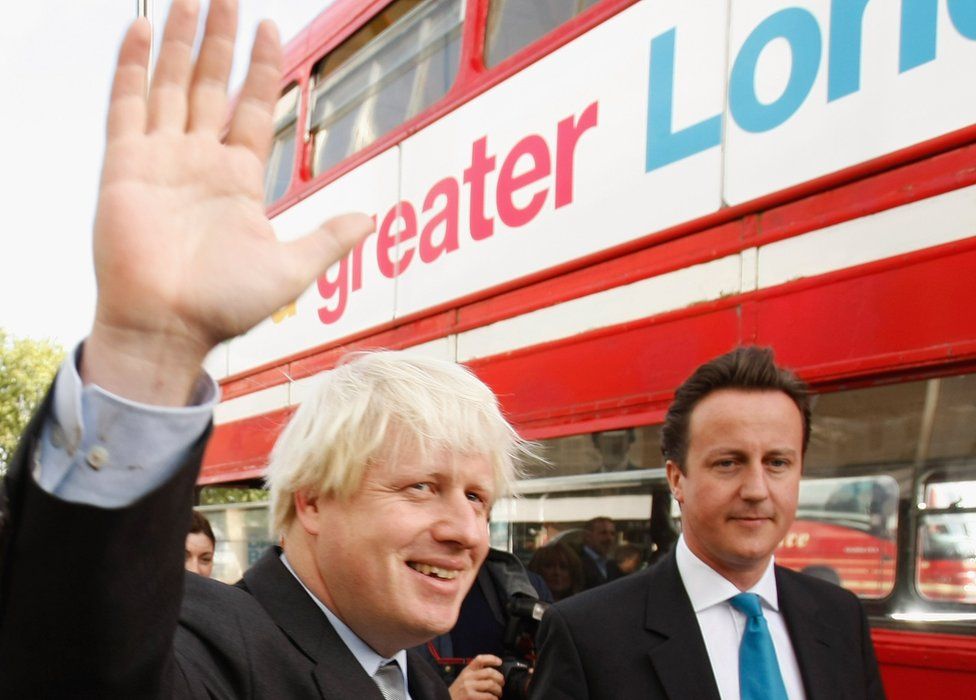The man behind the magazine wants a new law to protect future generations – but is anyone listening?

image copyrightPA Media
Politicians are often accused of not being able to look beyond the next day’s headlines or, perhaps, the next election.
John Bird is aiming to change that.
As the founder of the Big Issue, he has helped thousands of homeless people turn their lives around.
But – to his frustration – he has not been able to do very much about the underlying causes of homelessness. That’s because, he says, like other social problems, it is always treated as an emergency.
“About 80% of the money that goes into social crises around the world goes into emergencies. Very little gets invested in prevention, and very little goes into the cure.”
He recalls his exasperation when he was approached by a wealthy donor with a cheque for £30,000.
“I asked ‘where do you want to put your money?’ She wanted to put it into emergencies. She felt that was the most humane thing to do.”
It was an understandable response, but Lord Bird had grown weary of short-term fixes. Building more homeless shelters does not prevent people from becoming homeless, he argued.
The reasons that their lives are broken are never properly addressed by those in power.
He decided to devote the next 10 years of his life doing something about that.
In 2015, he became a member of the House of Lords – a remarkable achievement for a self-described “former-slum boy” and “illiterate lout”.
He is a non-party crossbench peer, which gives him the perfect platform to lobby for the kind of far-reaching changes he wants to see in government, even if his new colleagues had him pigeonholed as a quick-fix merchant.
“It was like I was the most gorgeous thing ever invented,” he says, recalling his arrival in Parliament.
“I was surrounded by peers and MPs wanting me to help with emergencies.”

image copyrightReuters
But Baron Bird of Notting Hill was more interested in bending their ears about his new idea – the Wellbeing of Future Generations Bill – which, he claimed, could make such emergencies a thing of the past.
He is not the first person to call for an end to short-term thinking. It’s probably the most common cry of those who have spent any time inside the government machine.
At the same time, rising concern about climate change, and the sense – made more acute by the coronavirus pandemic – that the current generation of young people are getting a raw deal, has made “intergenerational fairness” an increasingly hot topic at Westminster.
But what exactly can politicians do about it?
And how can you predict what generations yet to be born will need?
Lord Bird is focusing his campaign on the environment and finding “sustainable” solutions to poverty, to “avoid the need for future generations of Big Issue vendors”. He wants laws being passed now to look 50 years into the future.
His bill is based on an initiative by the Labour administration in Wales, which since 2015 has had a Future Generations Commissioner.
The Welsh law has been criticised as “virtually useless”.
Lord Bird admits it can sound “namby pamby” and “vague” but he insists his version of the bill, which is being co-sponsored by Green MP Caroline Lucas, will have “more teeth”.
It will have a UK-wide commissioner, with the power to take organisations to court – and it will extend into the private sector, forcing larger companies to produce reports on their progress towards “wellbeing goals”.
To many Conservatives, this will reek of “red tape”.
“The danger here is that we add to a growing compliance burden without creating any real change in behaviour,” said Tory peer Baroness Brady, when the bill had its second reading in March last year.
She argued for a more “market-led solutions”, such as shareholder pressure to hold companies to account for their impact on the environment.

image copyrightGetty Images
And the UK government says that it is already making provision for future generations in its Environment Bill, which aims to make the UK carbon neutral by 2050.
Ministers have made warm noises about some aspects of Lord Bird and Caroline Lucas’s bill, but they will not be supporting it, meaning its chance of becoming law in its current form are close to zero, as it will run out of Parliamentary time.
Lord Bird is not giving up, however, and he believes he will eventually be able to get Boris Johnson on board.
The two men have a bit of history.

image copyrightGetty Images
Lord Bird says he very nearly beat Mr Johnson to be the Conservative candidate for London mayor in 2008.
His belief in self-help – giving the homeless a “hand up, not a hand out” – has always been attractive to certain Conservatives.
Mr Johnson was left “sweating” over a weekend while Lord Bird weighed up his options, the Big Issue founder wrote in a 2019 blog, and “blew a deep sigh of relief when I refused the offer”.
Lord Bird says he did not want to join the Conservative Party just to become its mayoral candidate. He has roots in the far left but now sits in the Lords as a non-party peer.
He believes Boris Johnson is a “malleable” figure with a gift for spotting the next big thing and attaching himself to it.
Indeed, the prime minister has already backed the Big Issue’s Future Generation Pledge campaign, after a fashion.
“I applaud the Big Issue for raising these critical issues, which are about the future of our children and grandchildren,” he said in a message before the 2019 general election.
Lord Bird’s plan is to keep up pressure on the PM by building a mass movement of young people, under the “today for tomorrow” banner – and to continue signing up MPs and peers to his cause.
“The government will not do anything unless there is a lot of pressure from outside.” he says.
Recently, dozens of MPs from all parties came face-to-face with young environmental campaigners via video link, in a mass lobbying exercise to promote the bill.
He accepts that the legislation may have to be changed to stand any chance of becoming law, but he adds: “I am not frightened if people say it is too vague, it is too broad brush. You have to start somewhere.”